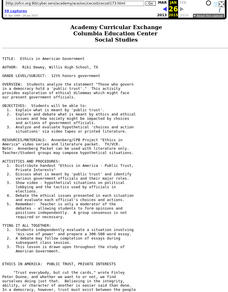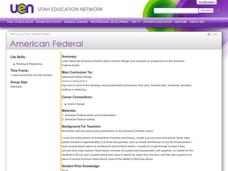Curated OER
Ethics in American Government
Engage 12th graders in a series of activities focused on public trust and ethics in US Government. They view a series of videos, hold a class debate, and compose a short essay. Note: Suggested videos are listed but are not available...
NPR
Civil Rights of Japanese-American Internees
Prompted by a viewing of Emiko and Chizu Omori’s Rabbit in the Moon, a documentary about the internment of Japanese-Americans during World War II, high schoolers examine a series of documents, including the Bill of Rights and the UN’s...
DocsTeach
Uncle Sam and the American Diet
Uncle Sam wants you to follow the food pyramid! Scholars analyze two images of propaganda posters the government created to promote the food pyramid. Academics complete a worksheet to understand the impact of the campaign and end the...
Center for History Education
Fighting for Whose Freedom? Black Soldiers in the American Revolution
Fight for freedom! The lesson delves into the world of African American soldiers during the American Revolution. Scholars read documents, such as the Dunmore Proclamation, to understand how the British government treated African...
National Endowment for the Humanities
The House Un-American Activities Committee
Was the House Un-American Activities Committee justified in investigating subversive influences in the entertainment industry? Part two of the three-part series of lessons that examine the anti-communism movement after World War II,...
Center for History Education
Breaking the Great League of Peace and Power: The Six Iroquois Nations During and After the American Revolution
What happens when you can't remain neutral? An informative lesson explores the impact of the American Revolution on the Iroquois Nations. Scholars learn about the six Iroquois nations and their treaty with the newly formed American...
Curated OER
American Dream and The Great Gatsby
Is the American Dream alive and well or has it dried up and died? As part of a study of The Great Gatsby, class members search for articles on the state of the American Dream, analyze the arguments presented in those articles, and then...
DocsTeach
Analyzing a Letter About American Indian Voting Rights
An informative activity focuses on the law preventing Native Americans from voting until 1947. Scholars read documents from the Office of Indian Affairs, complete an online worksheet, and participate in group discussion. Academics learn...
Center for History Education
Guatemalan Coup of 1954: How Did the Cold War Influence American Foreign Policy Decisions?
Was it all about the bananas—or the fear of a communist threat? Young historians use a history lab to examine documents from the American-led 1954 Guatemalan coup. Using graphics, government documents, and speeches, they examine the...
Center for Civic Education
What Basic Ideas About Government Are Included in the Preamble to the Constitution?
Young historians explore the meaning of the Preamble to the US Constitution in this upper-elementary social studies lesson. Working with partners or in small groups, children discuss the purpose of government before reading and analyzing...
Annenberg Foundation
Taming the American West
Have you ever seen a movie about the romance of the American West with its buffalo, horses, cowboys, and endless frontier? The 13th installment of a 22-part series on American history presents the myths associated with the American West....
North Carolina Consortium for Middle East Studies
Missing Pieces of the Puzzle: African Americans in Revolutionary Times
What's missing from most studies of the American Revolutionary War is information about the role African Americans played in the conflict. To correct this oversight, middle schoolers research groups like the Black Loyalists and Black...
Carolina K-12
African Americans in the United States Congress During Reconstruction
The Civil Rights Act of 1866, which granted citizenship to all males in the U.S., resulted in the first African Americans to be elected to Congress. Class members research 11 of these men, the challenges they faced, and craft...
New York City Department of Education
Colonial America and The American Revolution
How did the founding of the American colonies lead to a revolution? Use the essential question and sample activities to guide learners through a series of history lessons. Additionally, the packet includes effective strategies to...
Curated OER
Understanding American Values
Scholars read books and discuss emotions that lead up to the American Revolution. They also discuss vocabulary and use reference materials to research the Internet for causes and sentiment that led to the American Revolution.
K20 LEARN
Tribal Sovereignty and the Indian Reorganization Act: Tribal Governments
Sovereign nations or wards? High schoolers investigate the history of the Indian Reorganization Act and other legislation that impacted Native Americans. They also research different tribes' constitutions, compare them to the U.S....
Stanford University
Japanese American Incarceration
Using documents, such as reports from government sources and civil rights activists, budding historians explore the justification for forcing hundreds of thousands of Japanese-Americans to leave their lives and re-evaluate that tragic...
Curated OER
The Home Front: Convincing Americans to Help America Prepare
Sixth graders examine the actions of the U.S. Government after the attack on Pearl Harbor. In this preparation for war lesson, 6th graders analyze WWII posters and view a clip on the American Home Front. Students discuss and list the...
Curated OER
Governance- Grade 9
Ninth graders participate in talking circles about how their classroom will function. In this self-governance lesson, 9th graders participate in talking circle activities to create rules that will govern their class. Students compare...
iCivics
Tribal Government: High School
Did you know there are 567 federally recognized American Indian and Native Alaskan tribes and villages in the United States alone? The resource helps break down the complexities of many different tribal societies to explain the concept...
iCivics
Why Government?
Why do people create governments? Where did we get our ideas about government? This is a fantastic introductory instructional activity for your American government class that begins by reviewing the philosophies of Thomas Hobbes and John...
National Endowment for the Humanities
Starting a Government from Scratch
Young historians have an opportunity to experience the challenges of starting a new government. After watching a short video about the Articles of Confederation, class members generate a "to-do list" of actions that a new government...
Curated OER
American Federal Style
Explore American Federal design as it pertains to furniture, architecture, and influences on modern style. By the end of this lesson, learners should be able to recognize Federal design, its place in history, and how it has influenced...
Center for Instruction, Technology, & Innovation
Did African American Lives Improve After Slavery?
The Civil War made slavery illegal, but all ex-slaves were not totally free. Scholars visit eight different classroom stations to uncover life during the Reconstruction Era in America. Groups discover items such as Black Codes, 13th,...
Other popular searches
- Early American Government
- American Government Lesson
- American Government Projects
- Roots of American Government
- Colonial American Government
- American Government & Politics
- American Government History
- Native American Government
- American Government Branches
- Origins of American Government
- Latin American Governments
- American Government Simulation

























